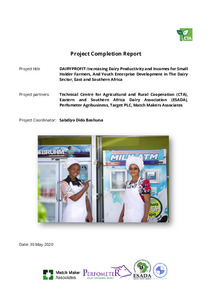CTA Project Completion Report: DAIRYPROFIT
Abstract
The project was effectively implemented for 18 months and has left behind legacies and innovations in the dairy sector, ranging from ICT platforms, the mini silage-balers, milk dispensing machines and innovative youth businesses. The mini silage-baler has made quality silage easily portable and affordable to smallholder farmers, transforming the silage value chain in the region. The milk dispensing machines in Tanzania has enabled BoP households to access safe and good quality milk. The project created popular ICT platforms for learning, advisory services and trading, attracting over 50000 hits in 3 months. The positive results can be partially attributed to the project’s flexibility in addressing the realities on the ground. In Ethiopia, after a rapid fodder market study it was established that the fodder value chain was underdeveloped with minimal opportunities for youths. The activities were then refocussed towards enhancing capacity of youth led and managed dairy enterprises that were in incubation under the Micro, Small and Medium Enterprise department. In the same context, Perfometer prepared a business case in the interest of private sector to import a mini-silage baler. This was due to failure to get local fabricators for the mini-silage baler, as envisaged in the project. Subsequently, the nature of field activities by the implementing partner were informed by the state of dairy sector development in the respective countries established during the forage scans.
Transformative dairy practices were identified in both East and Southern Africa through two exchange visits that took place, between Kenya and Zimbabwe. The practices are being piloted with the potential for upscaling through ESADA membership. The project also introduced the first ever dairy awards scheme that was greatly appreciated by the industry actors including the government. The inaugural dairy awards were held in Kenya and have been adopted by the Kenya Dairy Board as an annual event. Ethiopia and Tanzania dairy awards schedules were called off due to the restrictions of field activities related to COVID -19 pandemic. These restrictions have also meant that the contract for ESADA, the lead partner for implementation of Dairy AWARDs, had to be revised to adopt in -house activities such as development of a guideline on industry awards and publicising past winners; and to design and develop a dairy industry Knowledge portal, to pull together information relating to practises around milk quality and standards and to be able to communicate effectively with all industry actors. This also meant that they could not utilise all their contract budget, with about 42,000Eur budget reduction.

